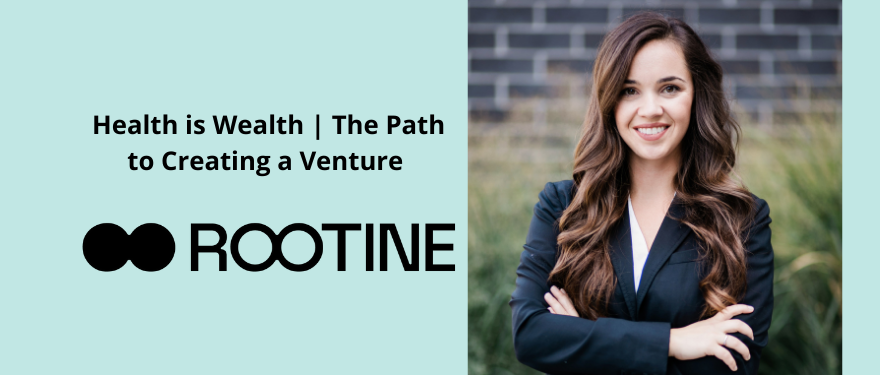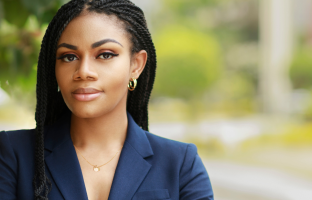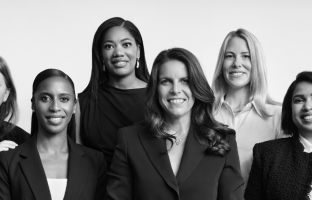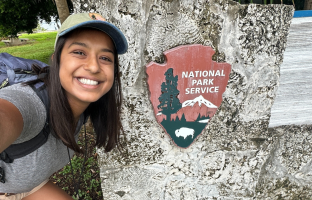Rachel Sanders (MBA 2017) started her professional career working in healthcare focused investment banking. After spending four years working at Raymond James focused on middle market transactions, M&A, and the intersection of technology and business, she had a strong understanding of the opportunities to leverage technology to help people experience their healthcare in a better way. Driven by her own personal health experiences in where she constantly used a guess and check methodology to improve her health, she sought to learn how to solve health outcomes for more than just herself. “That is really the crux of why I went to HBS, and why I chose to get an MBA. I knew that I wanted to build something that would make an impact on people’s lives. “
Rachel spent her two years at HBS immersed in learning and soaking up as much information and experience as she could. “Using those two years as a time to experiment, to learn to launch something, but also to gain the skills on the operational side, and to expand my network. I was great at finance, I understood the healthcare market, but there was a lot of opportunity for learning while at HBS that I was really excited about.”
RC year gave Rachel the foundation to make decisions on the fly and with little information. “If you’re operating as the Protagonist, what would you do…the case method beyond everything else really prepares you for the cold calls that you experience as a Founder, and that preparation is hard to get elsewhere.”
Leveraging the HBS alumni network, Rachel secured an internship between her RC and EC years at naviHealth, Inc... a digital health company. This internship allowed her to make an impact at the organization by working on projects that shaped new product development and strategy, allowing Rachel to gain experience across strategy, product, and operations within the healthcare space. She took that experience into her EC year, where she was able to continue to build her network and flex her skills.
It was in her EC year that Rachel connected with Julia Austin, senior lecturer at HBS’ Rock Center for Entrepreneurship. Rachel credits her connection with Austin as the biggest influence in her journey to becoming a Founder. Austin became a mentor, which she remains today, introducing her to “Good for Her,” a cohort of female founders, and connecting Rachel into the startup ecosystem initially.
Through her relationship with Austin, Rachel connected with Alex Iskold, Coach and VC in Resident at the Arthur Rock Center for Entrepreneurship at HBS and Managing Partner at 2048 Ventures [formerly Managing Partner of TechStars NY]. It was Iskold who would ultimately introduce Rachel to Dr. Daniel Wallerstofer, PhD, her Co-Founder at Rootine.
Launching Rootine
After launching her first venture during her EC year, Rachel started experiencing stress, fatigue, and signs of burnout. She started to look at not only her nutrition, but her overall lifestyle – what she was doing for exercise and her sleep patterns – to try to improve her performance. It was during this time that she connected with Wallerstofer, who had a PhD in biotechnology and had spent the previous decade building consumer facing nutrition products based on health data, starting with genetics, and then moving into blood levels. Collectively, Rachel and Wallerstofer saw an opportunity to build a precision nutrition brand that was more data driven, science backed, and truly personalized. “We came together on this mission to empower individuals to leverage their data to achieve optimal health.”
Rootine unlocks total body health through at-home lab testing, a precision multivitamin membership, in-app progress tracking, and an engaged, health-focused community. By combining science with health and wellness data, Rootine delivers a precision nutrition system that addresses each individual’s unique nutritional needs and provides real health benefits, differentiating itself from the competition.
Founded as a remote-first company, Rootine was positioned well when the pandemic forced companies to move to a remote work environment. With their technology already at scale, and the pandemic highlighting the need for consumer health at home, Rootine was able to harness this momentum and launch and deliver more, allowing people to live healthier lives in a more convenient way.
Female Founded & Future Focused
As a female founder, Rachel educated herself on the nuances of being the minority within the startup ecosystem. “I’ve learned a lot along the way related to fundraising, and specifically what it means to be a female founder fundraising. And those learnings, are very helpful as I think about raising future funding.”
As a result of her experiences, Rachel is committed to paying it forward and increasing the diversity of the startup ecosystem. “The tech startup and venture ecosystem is simply not diverse…I do my best every day, both as a leader of Rootine and [in] everything else that I’m doing to try to make a dent in that problem.” Close to 50% of the investors in Rootine’s seed round were diverse or non-traditional investors between women, people of color, and people from Latinx communities. Across most of their business, there is a fairly equal distribution between male and female employees. “We are paying attention to [creating a more diverse workforce as we scale up,] and making sure that we’re getting the most diverse perspectives around the table. Research shows us that you create better outcomes when you do that.”
“Looking at my angel investing and venture partner side, I believe that change will come from focusing on both sides of the table. Investing in more underrepresented founders, but also getting more non-traditional investors on cap tables. When I think about where I’m putting my small angel check dollars, it’s investing in female founders and getting females like myself on cap tables so more women have a seat at the table to voice their opinions.” The absence of women on cap tables has contributed to the gender wealth gap in the industry. “Thinking about how I can impact that on a small or large scale eventually, is something I’m constantly working on.”
Hiring for a Startup
Rachel advises other startups to find talent that is predisposed to solve problems and challenges. “Regardless of the role, I hire for curiosity. People that like to learn do better at a startup than people who don’t, because it inherently means there is a ton of problems that need to be solved…so the more people you bring on that can lean into problems and are curious around how to solve them, the better.”
Being a remote first company, culture is incredibly important. “Culture is different for every company, but making sure the person is an additive is a big one to focus on.” When hiring for Rootine, candidates are often asked to complete a take-home project to assess not only their communication skills and their professional abilities, but also their remote working capabilities. “When you’re remote, transparency is key. Communication is key, and the ability to set boundaries and understand when you do or don’t have to be on Slack without having to be told is key, especially at an early-stage startup.”
What’s Next for Rootine
As the first precision nutrition brand for the connected health consumer, Rootine is building an end-to-end platform to empower members to solve common health concerns like energy, stress, immune health and more through data, precision insights and nutrition products, and community.
With an increase in awareness and interest in health and wellness highlighted by the pandemic, Rootine continues to see success and grow. Rachel is looking forward to seeing her company continue to provide cutting edge solutions to health on a larger scale.





.png&w=80&h=80)

